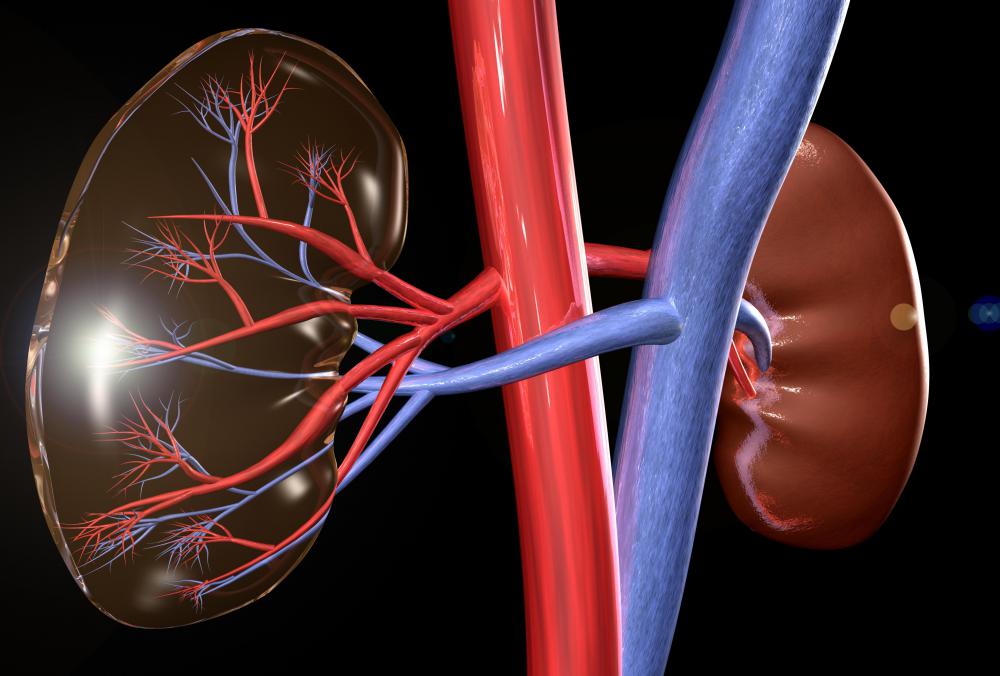At WiseGEEK, we're committed to delivering accurate, trustworthy information. Our expert-authored content is rigorously fact-checked and sourced from credible authorities. Discover how we uphold the highest standards in providing you with reliable knowledge.
What is a Microalbumin Test?
A microalbumin test is a diagnostic tool utilized to evaluate kidney function. The test measures urine protein levels and is generally administered in cases where the individual is known to have hypertension or diabetes. Requiring no individual preparatory measures, a microalbumin test is commonly utilized as a screening tool to diagnose microalbuminuria, a condition characterized by elevated albumin levels that occurs in the presence of kidney damage.
Normal kidney function involves the filtering and flushing of waste from the body in the form of urine. When an individual’s kidneys are functioning properly, his or her blood contains a protein known as albumin. In the presence of a faulty filtering system, albumin is allowed to seep into urine and be expelled as waste. The presence of certain conditions, such as hypertension and diabetes, can cause damage to the kidney filtering system contributing to the development of microalbuminuria and kidney disease. Considered a progressive condition, kidney disease requires a timely diagnosis and appropriate treatment to minimize the individual’s risk for complications and, ultimately, renal failure.

Prior to a microalbumin test, individuals are generally informed of how the test will be performed and given necessary instructions. The interpretation of test results is generally uniform in application, though some variance may occur in the presence of possible sample contamination and the laboratory standards. Additional factors that may influence test results include the use of certain medications, menstruation, and unstable glucose levels.

In the presence of abnormal results, elevated albumin protein levels are present, which is indicative of some degree of impaired kidney function. In most cases, abnormal results will prompt additional testing over a period of three to six months. A compilation of additional test results may then be evaluated as a whole to determine the extent of kidney damage. In the presence of confirmed kidney impairment, blood tests may be administered to evaluate creatinine levels. Often analyzed to offer an additional perspective of how well an individual’s kidneys are functioning, creatinine levels may be utilized to further verify the findings of the microalbumin tests.

The administration of a microalbumin test, also known as a microalbumin urine test, often occurs over the course of a set period of time. Urine collection that occurs in the home generally utilizes a single container that is marked with all necessary information, including the date of test administration and time of each sample collection. When performed in a medical setting, such as a clinic or physician's office, a single sample is obtained during what is known as a clean-catch midstream urine collection.

When conducted as a timed collection, which is generally over a 24-hour period, a microalbumin urine test may be performed at home. Timing for the 24-hour urine collection generally begins with the individual's first urination in the morning when he or she awakens for the day. Sample collection begins with the second urination and continues with each emptying of the bladder for the remaining 24 hours. Known as a timed collection, this approach to microalbumin testing requires that the obtained samples remain refrigerated until the final sample is obtained. In order to avoid contamination, individuals are instructed to use a clean container for each sample collection, avoid handling the inside of the container, and not allow any foreign substances or materials to contaminate the collected urine.

The most common administration of a microalbumin test occurs in a medical setting and involves a single collection of less than three fluid ounces (89 ml) of urine. Individuals are usually given strict instructions to avoid sample contamination, including washing one’s hands prior to handling the collection container and not allowing the container to contact or contain any foreign substance or material. Collected during midstream, the sample is generally secured with a lid to avoid post-collection contamination. The obtained sample is then sent for laboratory analysis.
AS FEATURED ON:
AS FEATURED ON:

















Discuss this Article
Post your comments